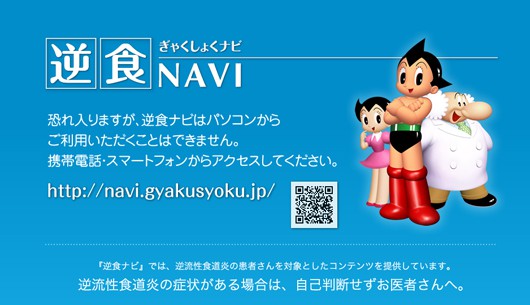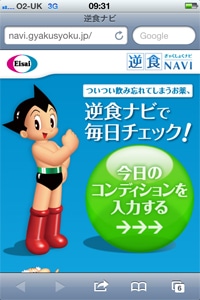
Eisai has launched a new mobile website to encourage Japanese patients suffering from reflux esophagitis to continue taking their medication.
The pharma company, which markets reflux treatment Pariet (rabeprazole), has enlisted iconic manga cartoon character Astro Boy (Tesuwan Atom) as the Gyakushoku Navi campaign’s mascot.
While the site stands out among pharma’s digital marketing efforts just for having a mobile website (still a rare occurance within the industry) Gyakushoku Navi is in fact only available for mobile users. The campaign does have a desktop version of the site, but its only use is to provide a QR code for visitors to scan on their phones in order to be directed to the mobile site.
 The site offers a free members-only program for reflux esophagitis patients and aims to provide useful treatment and disease information via cell phones (so-called ‘feature phones’) and smartphones.
The site offers a free members-only program for reflux esophagitis patients and aims to provide useful treatment and disease information via cell phones (so-called ‘feature phones’) and smartphones.
Mobile phone ownership rates are high among Japan’s 126m inhabitants, and analysts Comscore estimate 101.7m people age 13 and older use either a feature phone and smartphone. Meanwhile QR codes, whose effectiveness continues to be debated in the West, originated in Japan.
Those that suffer from reflux esophagitis can sign up to Eisai’s site and use it to keep a daily record of the medication they are taking, their physical condition and access a selection of “stomach-friendly recipes”.
These have been specially designed in cooperation with publishing company Tanita Corporation for people with reflux esophagitis, gastritis and gastric ulcers.
From June the mobile site will also offer Eisai’s Stomach Friendly Restaurant ‘training tool’, a quiz-based tool that allows users to make and gather recipes developed by Tanita Corporation using ingredients they have collected for each correctly answered question.
The number of Japanese patients with reflux esophagitis has doubled over the last decade with the country’s increasingly westernised diet and subsequent increase in obesity, ageing society thought to be partly to blame.
The disease causes inflammation of the mucosal lining of the esophagus due to the back flow of stomach acid and is most commonly treated with drugs designed to suppress the secretion of stomach acid.
But as reflux esophagitis frequently recurs, patients have to continue to take their medication for the duration of their treatment, and it is adherence to this that Eisai hopes to encourage.
The Japanese pharma company launched its reflux esophagitis drug Pariet in Japan in 1997. The proton pump inhibitor, which competes with AstraZeneca’s Nexium (esomeprazole), is currently in phase IV trials examining its effect on quality of life, data from which is expected next year.




